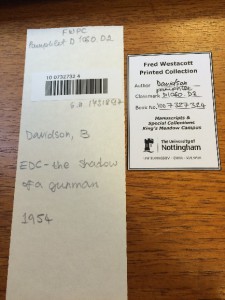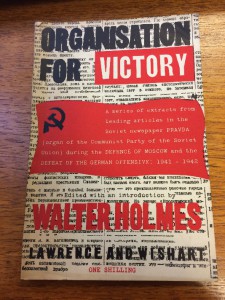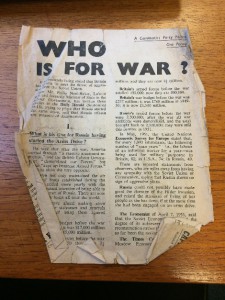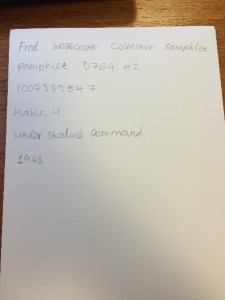
November 30, 2015, by Kathryn Steenson
Nottingham Advantage Award Placement: Working on Westacott
This is a guest post by Sophie Burton, an undergraduate student in the Department of History.
For the Nottingham Advantage Award ‘Experience Heritage’ module I have been conducting a weekly placement at Manuscripts and Special Collections. The placement has informed me about the different roles within the heritage sector. I have undertaken digitisation work on the university photo archive and created my own mini-exhibition for the reading room display case.
A key task throughout my placement has been cataloguing, working specifically on the Fred Westacott Printed Collection. Fred Westacott was a member of the Communist Party of Great Britain and collected a variety of communist and socialist pamphlets over his lifetime. The pamphlet collection is extremely diverse covering both local and international events including the fall of fascism and the Campaign for Nuclear Disarmament.
Cataloguing the pamphlets involved firstly checking that the class mark of the item had been correctly entered into the library catalogue and rectifying this if there was a mistake. Then I had to record onto acid free paper and a separate bookplate the author, title and date of publication of the material concerned. This was crucial to get right as it helps archivists locate the item in the store. It was nice to know that the work I was completing would help speed up the location process of items and ensure the archive remained ordered and systematic.
Whilst I was embossing the items with a crimping tool I was able to study the items in my care. The variety of topics covered within the pamphlets was very interesting; from war pamphlets to amusing political cartoons. It was fascinating to read the various political perspectives from the authors which included both Eastern and Western perspectives on communism, for example Russian authors such as Khrushchev. This collection was ideal for me to work on because I am extremely interested in Socialism and Communism. It was great to discover such a wealth of political material in great condition.
Over the duration of the task as I became more familiar with the quality of the collection I became better at assessing how fragile items were. The pamphlets in the poorest condition such as those with the front cover falling off needed to be placed in a pamphlet envelop to protect them. The pamphlet envelopes contain the same vital information as the bookplates. It was important to develop an understanding of which items were in the worst condition as despite several pamphlets being delicate, the envelopes are expensive therefore reserved for special cases. I was pleased when I could reduce the size of envelope a pamphlet had been placed into, making the use of the envelopes more economical.
Overall my experience of working at Manuscripts and Special Collections has been highly enjoyable and informative. I believe I have gained a real insight into the sector and remain interested to explore possible career opportunities further.
No comments yet, fill out a comment to be the first







Leave a Reply